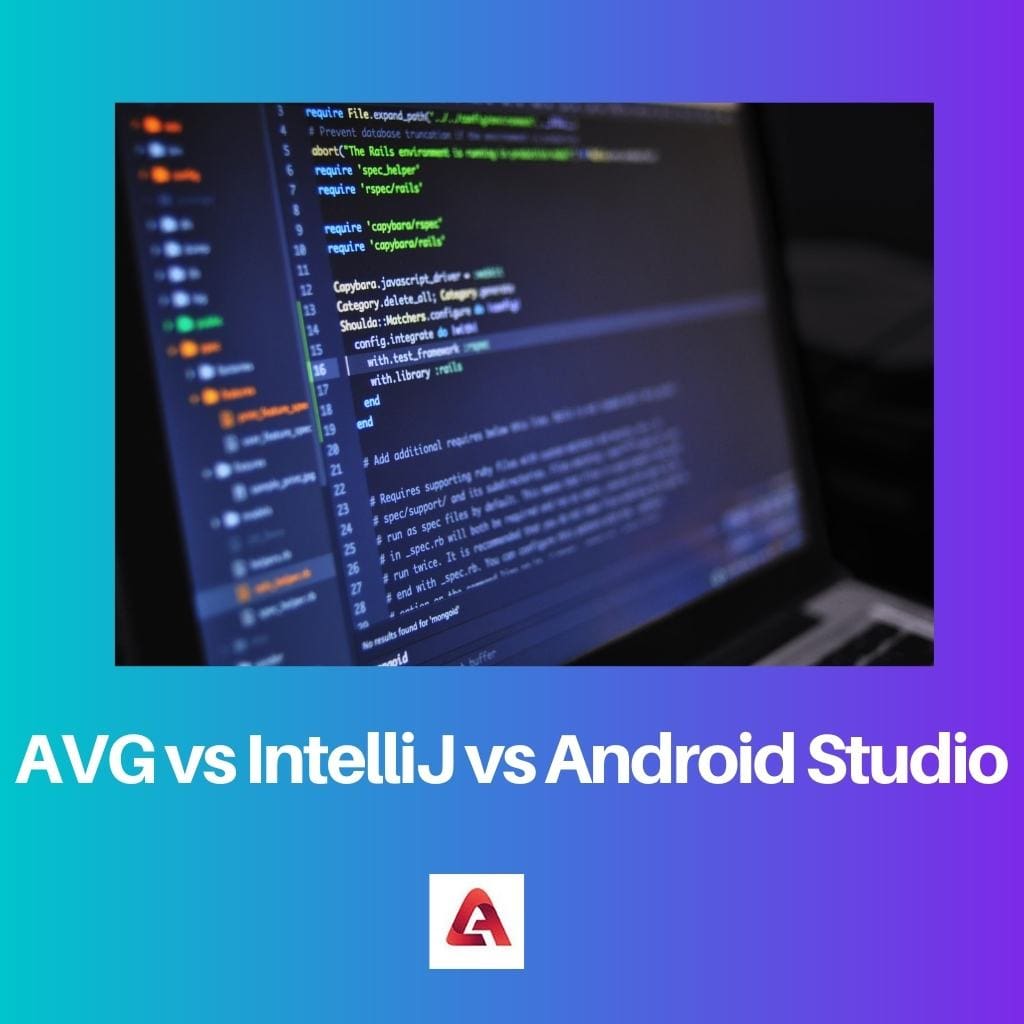IntelliJ IDEA is a versatile IDE primarily for Java development, offering robust features and support for various languages and frameworks. Android Studio, built on IntelliJ’s platform, is specialized for Android development, providing tailored tools and integrations specifically for building Android applications, including advanced layout editors and debugging support.
Key Takeaways
- IntelliJ IDEA is a versatile Integrated Development Environment (IDE) for various programming languages, whereas Android Studio specifically targets Android app development.
- Android Studio is built on the IntelliJ platform, incorporating additional features and tools for Android development, such as a robust emulator and XML editor.
- IntelliJ IDEA offers a broader range of plugins and integrations for different frameworks and technologies, whereas Android Studio primarily focuses on enhancing the Android app development process.
IntelliJ vs Android Studio
IntelliJ IDEA is a Java-based IDE developed by JetBrains. Android Studio includes several features designed specifically for developing Android applications, such as the Android emulator, XML layout editor, and the ability to easily create a new Android project with preconfigured settings.

The IntelliJ or IntelliJ IDEA is an IDE for JVM, that is, Java Virtual Machine, and helps the developer to run error-free code by reducing repetitive work and thereby develop, model, and deploy computer software.
Android Studio is another IDE that is specifically targeted for Android app development. It can be used to build, create, and debug the code and test on Android platforms like phones, tablets, TVs, etc.
Comparison Table
| Feature | IntelliJ IDEA | Android Studio |
|---|---|---|
| Primary Focus | General-purpose IDE | Android app development |
| Supported Languages | Java, Kotlin, Python, JavaScript, PHP, Ruby, Go, and more | Java, Kotlin, C++, and other relevant to Android development |
| Android Development | Requires plugin | Built-in features and tools |
| Learning Curve | Steeper | Easier for beginners |
| Cost | Community Edition (free with limited features), Ultimate Edition (paid) | Free and open-source |
| Best for | Developers working on various projects beyond Android | Developers focused on Android app development |
What is IntelliJ?
IntelliJ IDEA is an integrated development environment (IDE) created by JetBrains, designed to facilitate efficient software development across a wide range of programming languages and frameworks. With its robust feature set, intelligent code assistance, and seamless integration with various tools, IntelliJ IDEA has become a popular choice among developers for building high-quality applications.
Features
- Smart Code Assistance: IntelliJ IDEA offers advanced code completion, intelligent code analysis, and quick-fix suggestions, helping developers write clean, error-free code efficiently. It provides context-aware suggestions and can detect potential issues in real-time, enhancing productivity and reducing debugging time.
- Rich Plugin Ecosystem: The IDE supports a vast array of plugins, allowing developers to customize their development environment according to their specific requirements. These plugins cover a wide spectrum of functionalities, from version control systems to build tools, testing frameworks, and more, empowering developers to tailor IntelliJ IDEA to their workflow preferences.
- Powerful Refactoring Tools: IntelliJ IDEA simplifies the process of code refactoring, enabling developers to make structural changes to their codebase with confidence. It offers a variety of refactorings, such as renaming variables, extracting methods, and optimizing imports, all while ensuring the integrity and consistency of the code.
- Integrated Development Environment: IntelliJ IDEA provides a comprehensive set of tools for software development, including code editors, version control integration (e.g., Git), debugging tools, and built-in support for various build systems (e.g., Maven, Gradle). Its intuitive user interface and seamless project management capabilities streamline the development workflow, allowing developers to focus on writing code without distractions.
- Cross-Language Support: While IntelliJ IDEA is renowned for its support for Java development, it also offers robust support for a wide range of programming languages and frameworks, including Kotlin, Scala, Groovy, JavaScript, TypeScript, and more. This versatility makes it a versatile IDE for multi-language projects and enables developers to work on diverse software projects within a unified environment.

What is Android Studio?
Android Studio is the official integrated development environment (IDE) for Android app development, developed by Google and based on JetBrains’ IntelliJ IDEA. It is specifically designed to streamline the process of creating Android applications, offering a comprehensive set of tools and features tailored to the needs of Android developers.
Features
- Android-specific Tools and Integrations: Android Studio provides specialized tools and integrations that simplify Android app development. It includes an intuitive user interface designer (Layout Editor) for creating visually appealing user interfaces using drag-and-drop components, as well as tools for managing app resources, such as images, strings, and layouts.
- Advanced Code Editing and Analysis: Android Studio offers powerful code editing features, including syntax highlighting, code completion, and code navigation, to enhance productivity and facilitate code readability. It also integrates with Android-specific libraries and APIs, providing context-aware suggestions and quick-fixes for common Android development tasks.
- Built-in Emulator and Device Testing: Android Studio includes a built-in Android Emulator that allows developers to test their apps on various virtual devices with different screen sizes, resolutions, and Android versions. Additionally, it supports seamless integration with physical Android devices for real-time testing and debugging, enabling developers to identify and fix issues quickly.
- Performance Profiling and Optimization: Android Studio provides tools for performance profiling and optimization, helping developers identify performance bottlenecks and optimize their apps for better responsiveness and efficiency. It offers insights into CPU, memory, and network usage, allowing developers to diagnose performance issues and improve app performance.
- Integration with Google Services: Android Studio seamlessly integrates with various Google services and APIs, such as Google Play services, Firebase, and Google Cloud Platform, enabling developers to incorporate powerful features like authentication, analytics, cloud storage, and machine learning into their apps with ease.
- Version Control and Collaboration: Android Studio includes built-in support for version control systems like Git, allowing developers to manage their source code repositories directly within the IDE. It also facilitates collaboration among team members through features such as code review tools and integration with popular collaboration platforms like GitHub.

Main Differences Between IntelliJ and Android Studio
- Target Platform:
- IntelliJ IDEA is a general-purpose IDE suitable for various programming languages and frameworks, including Java, Kotlin, Scala, and more.
- Android Studio, built upon IntelliJ IDEA, is specialized specifically for Android app development, providing dedicated tools and integrations for building Android applications.
- Features and Integrations:
- IntelliJ IDEA offers a wide range of features and integrations suitable for general software development, including smart code assistance, powerful refactoring tools, and support for multiple languages and frameworks.
- Android Studio includes Android-specific tools and integrations, such as a layout editor, emulator, and performance profiling tools, tailored specifically for Android app development.
- Target Audience:
- IntelliJ IDEA caters to developers working on a variety of software projects across different domains, including web development, enterprise applications, and desktop software.
- Android Studio is primarily targeted at developers focused on building Android applications, providing specialized features and optimizations for the Android platform.
- Emphasis on Android Development:
- Android Studio emphasizes features and optimizations specific to Android app development, such as layout editors, device emulators, and integration with Google services like Firebase and Google Play.
- Version Control and Collaboration:
- Both IntelliJ IDEA and Android Studio offer built-in support for version control systems like Git, enabling developers to manage their source code repositories and collaborate with team members effectively.
- Community and Ecosystem:
- IntelliJ IDEA has a broad user base and a vibrant ecosystem of plugins and community support, catering to developers working on diverse software projects.
- Android Studio benefits from the extensive Android developer community and ecosystem, with resources, libraries, and documentation tailored specifically for Android app development.




